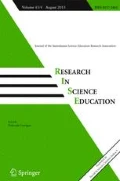Abstract
This paper provides a report of a case study on the professional agency of an experienced early years teacher, Sarah, who successfully embedded a chemical science program of teaching-learning for her students aged between 6 and 8. Interactive ethnography informs the research design, and discursive psychology provides the tools for the analysis of Sarah’s speech acts for her positioning as a responsible agent. Reframing the problem of primary teacher reluctance to teach science in terms of primary teachers’ professional agency using discursive psychology, this ontological study provides new insight into issues related to the provision of science education in primary schools and asks: How do primary teachers position themselves and others in relation to science curriculum and education? The research calls for research methodologies and reform efforts in primary science that are better grounded in the local moral orders of primary schools.
Similar content being viewed by others
References
Arnold, J. (2005). Researching teacher agency in primary school science: A discursive psychological approach. Masters Thesis. Melbourne: The University of Melbourne.
Arnold, J. (2012). Addressing the balance of agency in science classrooms. PhD Thesis. Melbourne: The University of Melbourne.
Arnold, J., & Clarke, D. J. (2014). What is ‘agency’? Perspectives in science education research. International Journal of Science Education, 36(5), 735–754.
Barad, K. (2007). Meeting the Universe Halfway: Quantum Physics and the Entanglement of Matter and Meaning. Durham: Duke University Press. https://doi.org/10.1215/9780822388128.
Carter, L., Castano Rodriguez, C., & Martin, J. (2017). Embedding ethics of care into primary science pedagogy: reflections on our criticality. In J. Bazzul & C. Siry (Eds.), Critical Voices in Science Education Research: Narratives of Academic Journeys. Dordrecht: Springer.
Chiew, F. (2014). Posthuman ethics with Cary Wolfe and Karen Barad: animal compassion as trans-species entanglement. Theory, Culture & Society, 31(4), 51–69.
Corcoran, T. (2015). Ontological constructionism. In A. Williams, T. Billington, & D. Goodley (Eds.), Critical Educational Psychology. London: Wiley Blackwell.
Crevola, C. A., & Hill, P. W. (1998). Children’s literacy success strategy: an overview. Melbourne: Catholic Education Office.
Davies, B. (1990). Agency as a form of discursive practice. A classroom scene observed. British Journal of Sociology of Education, 11(3), 341–361.
Department of Education and Training (DE&T) (2002). Early Years Research Project (1999–2001): summary of the final report. http://www.sofweb.vic.edu.au/eys/num/enrp.htm accessed on 27/10/2004.
Edwards, A. (2015). Recognising and realising teachers’ professional agency. Teachers and Teaching, 21(6), 779–784.
Gabel, D., & Rubba, P. (1979). Attitude changes of elementary teachers according to the curriculum studied during workshop participation and role as model science teachers. Journal of Research in Science Teaching, 16(1), 19–24.
Goffman, E. (1959). The presentation of self in everyday life. NY: Doubleday Anchor Books.
Harlen, W. (1997). Primary teachers’ understanding in science and its impact in the classroom. Research in Science Education, 27(3).
Harlen, W. (2000). The teaching and learning of science in primary schools. London: David Fulton Publishers Ltd..
Harré, R. (1984). Personal being: a theory for individual psychology. Cambridge, Mass: Harvard University Press.
Harré, R. (1990). Exploring the human umwelt. In R. Bhasker (Ed.), Harré and his critics: essays in honour of Rom Harré with his commentary on them. Oxford: Blackwell.
Harré, R. (1992). What is real in psychology; a plea for persons. Theory and Psychology, 2(2), 153–158.
Harré, R., & van Langenhove, L. (1999). The dynamics of social episodes. In Harré & van Langenhove (Eds.), Positioning Theory. Oxford: Blackwell.
Hodson, D. (2002). Countering reluctance in elementary science education: contrasting approaches via action research. Canadian Journal of Science, Mathematics and Technology Education, 2, 3.
Lerman, S. (2001). Cultural, discursive psychology: a sociocultural approach to studying and the teaching of mathematics. Educational Studies in Mathematics, 46, 87–113.
Martin, J. (2016). The grammar of agency: studying possibilities for student agency in science classroom discourse. Learning Culture and Social Interaction, 10, 40–49. https://doi.org/10.1016/j.lcsi.2016.01.003.
Murphy, C., Neil, P., & Beggs, J. (2007). Primary science teacher confidence revisited: ten years on. Educational Research, 49(4), 415–430.
Shawver, L. (2001) Privileging persons. Postmodern Therapies News. http://postmoderntherapies.com/pm0701.htm accessed 9th June, 2012.
Shotter, J. (2013). Agentive spaces, the ‘background’, and other not well articulated influences in shaping our lives. Journal for the Theory of Social Behaviour, 43(2), 33–154.
Smith, G. (2015). The impact of a professional development programme on primary teachers’ classroom practice and pupils’ attitudes to science. Research in Science Education, 45(2), 215–239.
Spradley, J. (1979). The ethnographic interview. (Spradley 1979).
Sutton, C. (1996). Beliefs about science and beliefs about language. International Journal of Science Education, 18(1), 1–18. https://doi.org/10.1080/0950069960180101.
Tytler, R., Prain, V., Hubber, P., & Waldrip, B. (Eds.). (2013). Constructing Representations to Learn in Science. https://doi.org/10.1007/978-94-6209-203-7.
Van Manen, M. (1990). Researching lived experience: human science for an action sensitive pedagogy. State University of New York Press.
Vygotsky, L. S. (1978). Mind in society. Cambridge: Harvard University Press.
Walker, M., & Unterhalter, E. (2007). Amartya Sen’s capability approach and social justice in education. New York: Palgrave Macmillan.
Wallace, J., & Louden, W. (1992). Science teaching and teachers’ knowledge: prospects for reform of elementary classrooms. Science Education, 76(5), 507–521.
Wood, L. A., & Kroger, R. O. (2000). Doing discourse analysis: methods for studying action in talk and text. Thousand Oaks: Sage Publications.
Woods, P. (1996). Researching the art of teaching; ethnography for educational use. London: Routledge.
Acknowledgements
I am grateful to the guidance of Jo Sadler (dec.) and Dr. Rod Fawns who were my supervisors during this research project and to the Victorian Government who funded my employment at the school as the Scientist in Residence through the school’s successful application to their Scientists and Engineers in Schools Initiative.
Author information
Authors and Affiliations
Corresponding author
Electronic Supplementary Material
ESM 1
(DOCX 142 kb)
Rights and permissions
About this article
Cite this article
Martin, J. Researching Primary Teachers’ Professional Agency: Employing Interactive Ethnography to Overcome Reluctance to Teach Science. Res Sci Educ 49, 1279–1299 (2019). https://doi.org/10.1007/s11165-017-9654-y
Published:
Issue Date:
DOI: https://doi.org/10.1007/s11165-017-9654-y




